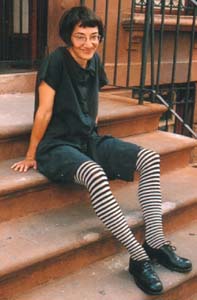![[MetroActive Books]](/gifs/books468.gif)
[ Books Index | Santa Cruz | MetroActive Central | Archives ]
Alphabet Soup
A fictional family delves into the bizarre culture of the spelling bee
By Valerie Ross
EACH OF THE four major characters in Myla Goldberg's first novel, Bee Season (Anchor, $13), has a secret. They also have a near fatal flaw or wound within them, which they use their secret lives to manage, protect and heal.
The novel focuses on an otherwise unremarkable 10-year-old girl named Eliza Naumann, who becomes a spelling prodigy overnight. But it is also the story of Eliza's family and her poignant desire for this eccentric, alienated cast of characters to just be normal for once and love each other, at any cost.
Since the novel is narrated alternatively from each of these four characters' perspectives, the reader is in the privileged position of watching the birth and gradual hypnotic development of their separate secret lives. Goldberg creates a complicit intimacy between her reader and her characters; ironically, we know more about them than they know about each other. We are compelled to become a temporary member of this disjointed family, and are seduced into their private worlds with promises of depth, personal discovery and mystical revelations that ring so true, we begin to want them for ourselves.
Eliza's father, Saul, is a bohemian scholar of the Kabbalah--the intellectual tradition of Jewish mysticism--and is a failed, somewhat embittered aspirant to the mysteries himself. Eliza's troubled, brilliant mother, Miriam, may actually be a taunting embodiment of the mysteries Saul has failed to fathom. She is an enigma even to the reader.
Goldberg gives us both subtle and overt clues to Miriam's secret and the complex wound she carries within. But not until the end of the novel do we, along with the rest of the Naumann family, comprehend the depth and beautiful madness of her split existence. Eliza's older brother Aaron manifests his quest for personal healing the most obviously--turning to Eastern spirituality in an effort to individuate from his father and to find the completion that all four characters are separately seeking.
It is ultimately Eliza and her journey into the world of spelling bee culture that keeps us drawn into the novel. Goldberg describes this strange cruel world of competition, anxiety, triumph and failure, all the way from the elementary school to the national level, with chilling clarity and insight. From the pained neuroses of the young contestants to the thinly veiled bitterness of the school, state and national officials who were once bee champions themselves, Goldberg gives surprising flashes of past personal history and individual dimension to even the most marginal characters. Everyone has a story, a wound or a loss in this book. We just happen to be focusing on one particular family, one tiny four-faceted slice of the larger social dysfunction.
Eliza's pleasure in her new spelling bee successes quickly escalates into a joyous reclamation of her father's affections. Saul, who had written his daughter off as being unexceptional, sees new evidence in her uncanny spelling ability of a certain mystic capacity that awakens his own lost dreams. He begins to train Eliza in the discipline of the Kabbalah and sure enough, she is a natural. Eliza's previous delight soon turns into a ravenous quest for the ecstasy she finds in the power of words. She moves from craving normal familial love to hungering for a transcendent form of divine love that brings her closer to the same hunger driving her mother, brother and father in their own separate, obsessive directions.
With honesty and straightforward eloquence, Goldberg leads us to ask how a family can become as dysfunctional as the Naumanns and, at the same time, what makes them any different than the rest of us. Like so many people, each character lives for an unattainable ideal and disregards the exceptional individuals sitting across the dinner table every night. They are each caught in elaborate webs of self-made rituals and rules that are intended to make them feel meaningful but only alienate them further from themselves. They live vicariously through books and words and beauty and other people's acceptance just like we do, and yet something about the extremes to which they push these ordinary crutches to bear the weight and pain of existence tells us to be careful.
[ Santa Cruz | MetroActive Central | Archives ]
Copyright © Metro Publishing Inc. Maintained by Boulevards New Media.
![]()
 To Bee or Not: Myla Goldberg's novel, 'Bee Season,' focuses on a 10-year-old spelling prodigy.
To Bee or Not: Myla Goldberg's novel, 'Bee Season,' focuses on a 10-year-old spelling prodigy.
Myla Goldberg reads from 'Bee Season,' 7:30pm on Saturday, June 23, at Bookshop Santa Cruz, 1520 Pacific Ave. (831.423.0900)
From the June 20-27, 2001 issue of Metro Santa Cruz.